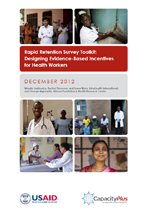
New Resource Spotlight: Rapid Retention Survey Toolkit and eLearning Course
We need more health workers, especially in rural and remote areas. According to the World Health Organization, nearly half of the world’s population lives in these areas, yet less than 38% of the world’s nurses and a quarter of the world’s doctors work there. How can countries ensure health workers are deployed where they are needed most?
CapacityP lus announces the Rapid Retention Survey Toolkit: Designing Evidence-Based Incentives for Health Workers, a new tool that will help health leaders find out what motivates health workers to accept posts in rural areas—and to stay there. A new eLearning course will guide health leaders to apply the toolkit in their country or context.
lus announces the Rapid Retention Survey Toolkit: Designing Evidence-Based Incentives for Health Workers, a new tool that will help health leaders find out what motivates health workers to accept posts in rural areas—and to stay there. A new eLearning course will guide health leaders to apply the toolkit in their country or context.
The Rapid Retention Survey Toolkit builds on the WHO’s global policy recommendations, which describe ways to retain more health workers in rural and remote areas by combining interventions and approaches related to education, financial incentives, regulation, and professional development. Given the limited resources in the public health sector, it is essential to choose the correct combination that will most effectively attract and retain health workers to provide services in rural clinics from the start.
Simplifying a powerful research method
The toolkit, developed by Wanda Jaskiewicz, Rachel Deussom, Laura Wurts, and George Mgomella, is based on the discrete choice experiment (DCE), a powerful research method that identifies the trade-offs professionals are willing to make between specific job characteristics and determines their preferences for various incentive packages. Although DCEs have been carried out in many countries, it is only relatively recently that the methodology is being used to assess health workforce issues.
Until now, the majority of DCEs in the health field have required the assistance of international senior health economists or experienced academicians. In contrast, the toolkit employs a simplified approach, the “rapid DCE,” which was developed for use by human resources managers in the health workforce, so they can follow the DCE survey process to rapidly assess health professional students’ and/or health workers’ motivational preferences to take up posts and remain in underserved facilities. The results of the survey can then be used to create evidence-based incentive packages that are appropriate within a country’s health labor market, and can provide compelling evidence for health workforce decision-making.
The toolkit includes step-by-step instructions for conducting the survey, sample formats, and examples that can easily be adapted to a specific country context, including:
- Survey planning, including determining the health worker cadre(s) to focus on and conducting focus group discussions
- Survey design, including selecting job attributes and levels (based on focus group discussions) for health professionals to choose from
- Survey instrument development using a specialized software program
- Survey administration
- Data analysis and interpretation
- Presentation of results to stakeholders.
Building capacity through eLearning
CapacityPlus’s HRH Global Resource Center produced and published a free online course to train users on how to apply the Rapid Retention Survey Toolkit. The eLearning course provides detailed instructions on implementing the elements of the toolkit and video demonstrations of the specialized software required for data analysis. The eLearning course was created to provide another medium to learn about the rapid DCE process and the various planning and implementation logistics. The course can also serve as an advocacy tool for policy-makers and other stakeholders who may be interested in learning more about the toolkit to discern if it will be appropriate for their context and health labor market.
Through taking the eLearning course and applying the toolkit, more countries will be able to design evidence-based incentive packages for health workers.
Combining tools for policy change
The Rapid Retention Survey Toolkit can be combined with iHRIS Retain, a software tool developed by CapacityPlus and the WHO to cost retention interventions. The result is the development of an affordable, cost-effective retention package designed by country stakeholders to meet health worker needs within their specific context, and ultimately contribute to more health workers serving rural communities.
CapacityPlus field-tested these tools in Lao People’s Democratic Republic, with the Ministry of Health and in partnership with the WHO, where about two-thirds of the population lives in rural areas. The results informed a new national recruitment and retention policy for the health workforce. The policy stipulates that all new graduates in medicine, nursing, midwifery, pharmacy, and dentistry, as well as postgraduates in family medicine, must complete three years of rural service in order to receive their licenses to practice. The policy also provides specific incentives (e.g., housing and eligibility for continued education), based on the survey and costing results, to motivate health workers to provide high-quality services while carrying out their rural service, as well as encourage them to stay after the compulsory service has ended.
We invite you to use the Rapid Retention Survey Toolkit and enroll in the eLearning course.
Related items:


